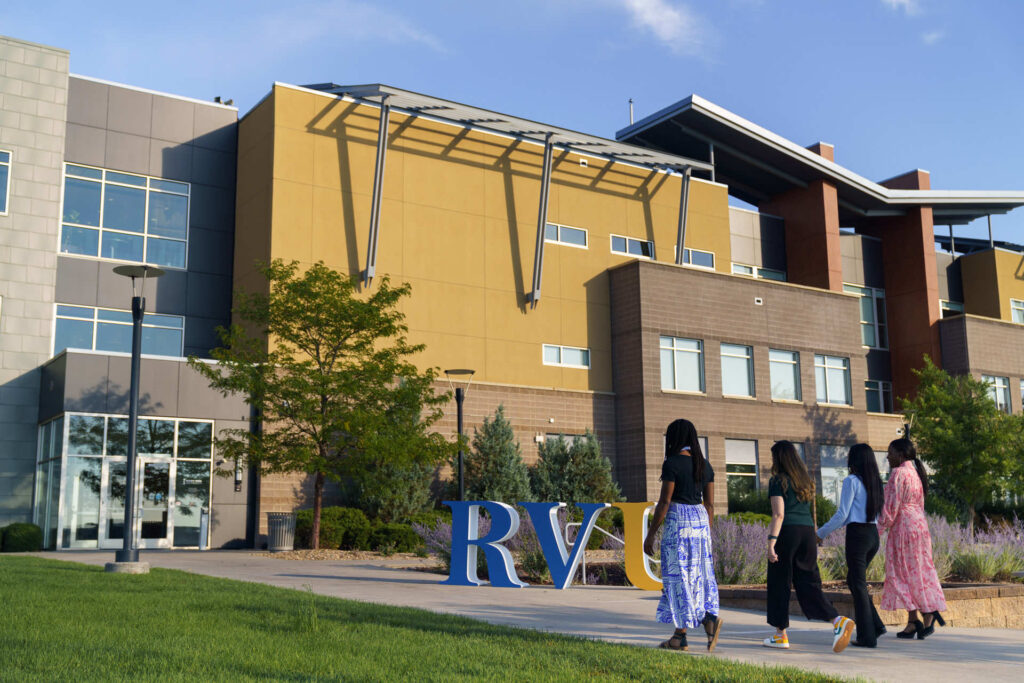Please refer to the Office of Compliance and Quality Assurance page for information about RVU’s Title IX policy, as well as information about sexual misconduct, sexual harassment, and sexual assault. There is also information on that page about how to report a crime.
Protect Yourself
- Avoid people who don’t allow you to make your own decisions and those who give you the feeling that you “owe them” something.
- Be very explicit with dates about how intimate you expect the relationship to be.
- Do not assume that a person will know that you are comfortable with “going so far” and no further.
- Don’t drink beverages that you did not open yourself.
- Don’t exchange or share drinks with anyone.
- Don’t drink from a container that is being passed around.
- If someone offers you a drink at a bar or club, accompany the person to the bar, watch the drink being poured, and carry the drink yourself.
- Don’t leave your drink unattended while using the restroom or making a phone call. If you realize you have left it unattended, throw the drink away.
- Don’t mix drugs and alcohol.
If you have been sexually assaulted, it’s never too late to get help.
- Go to a safe place.
- Call someone.
- Do not bathe, wash hands, or clean fingernails. It is important that victims preserve evidence that may be necessary to prove criminal sexual assault.
- Do not remove clothing worn during or following the assault as these frequently contain valuable fiber, hair, and fluid evidence.
- Do not apply or take any medication.
- Get medical attention as soon as possible.
- When you get to the hospital, tell the triage staff you have been sexually assaulted.
If the assault happened some time ago:
- Seek counseling.
- Seek medical attention for treatment of injuries or symptoms related to the assault.
- Consider reporting the incident to the police.
- Pursue the campus judicial process.
- Pursue academic or administrative assistance.
- Access other community support resources.
Coping with Sexual Assault
Victims of sexual assault may find it helpful to discuss their experience with a counselor. Victim advocates and counselors are available to meet with victims in an informal and private setting. Referrals for these services are available through the Student Affairs office. The Student Affairs Office and the Department of Campus Safety may also be able to assist in changing a student’s academic situation, by serving as a source of referral to outside agencies, and by providing information about on- and off-campus reporting, prosecution procedures, and the college disciplinary process.
College Response to a Sexual Assault
Sexual assault is a criminal act which subjects the perpetrator to criminal and civil penalties in state and federal courts. In addition, Rocky Vista University will respond administratively if a sexual assault or other criminal offense involves a student or employee as the offender. Students and employees are subject to applicable laws, college policies, and disciplinary procedures, including policies prohibiting sexual harassment.
Possible Sanctions Against Offenders
Victims may begin a disciplinary action by reporting the incident to the Department of Campus Safety or to the Student Affairs office. A written statement detailing the incident may be requested. The accuser and accused are entitled to have others present during a disciplinary hearing. In the case of sexual assault, both the accuser and the accused shall be informed of the outcome. In addition to any criminal sanctions, a sexual assault perpetrator is subject to appropriate employee or student disciplinary sanctions.
- Faculty and staff: the range of employment penalties include, but is not limited to, one or more of the following: counseling, reprimand, suspension, or termination of employment.
- Students: Students who violate federal, state, or local laws are subject to criminal charges. In addition, the perpetrator may be subject to disciplinary actions as set forth in the student code of conduct. The ranges of sanctions for violations of the code of conduct include, but are not limited to, one or more of the following: suspension, expulsion, alteration of class schedule, probation, loss of privileges, or a warning.
Rights of the Victim
A person who reports having been sexually assaulted has the right to:
- Request a female or male officer to take the report.
- Have his/her identity protected, consistent with legal requirements.
- Be treated professionally and with sensitivity, regardless of race, ethnicity, religion, gender, or sexual orientation of the victim or the perpetrator.
- Assistance with medical treatment, counseling, and other resources, including transportation to a hospital, if desired.
- Be informed of the outcome of a police investigation.
- Request an alternative academic or employment situation, if such an alternative is available.
- Have all questions answered fully.
- Upon request, the College will disclose to the alleged victim of a crime of violence or a non forcible sex offense, the results of any disciplinary hearing conducted by the College against the student who is the alleged perpetrator of the crime or offense. If the alleged victim is deceased as a result of the crime or offense, the College will provide the results of the disciplinary hearing to the victim’s next of kin, if so requested.
Reporting Sexual Misconduct
The University encourages all individuals to report possible sexual misconduct that they suffer or observe and requires responsible employees of the University to do so, using one of the investigative resources described below.
The purpose of these investigation procedures is to provide prompt and equitable processes for addressing and investigating incidents of sexual misconduct allegedly committed against students and employees. A lengthy period of time between an alleged occurrence and an investigation may make fact-finding more difficult; therefore, individuals are encouraged to raise concerns and complaints as soon as possible.
The University provides three different procedures, described below, for investigating and adjudicating Requests for Investigation of sexual misconduct allegedly committed by students. The first two options address Requests for Investigation alleging misconduct other than sexual violence: An Informal Conciliation Process and a Formal Investigation Process, and a third process is available only for Sexual Violence Requests for Investigation: The Sexual Violence Response Process.
If you are unsure about the appropriate process for a Request for Investigation or unsure whether to file a Request for Investigation, please contact the University’s Title IX Coordinator at (720) 874-2481 or [email protected] for an initial meeting, wherein the Title IX Coordinator will discuss the options and answer any questions.
The University highly recommends that the Reporting Party of sexual violence seek immediate medical attention after the incident. The Title IX Coordinator will provide, if needed, referrals to a medical professional.
In addition, please notify the RVU Department of Campus Safety, as well as the police jurisdiction where the assault occurred or 911.
For those who are victims of sexual assault, it is important to get immediate medical attention, even if there are no obvious physical injuries. Go to the emergency room of the nearest hospital. A physical examination will help to assure that any injuries will be identified and treated and that victims receive important information about the risks for sexually transmitted disease.
An examination does not obligate a victim to any kind of investigation; however, it allows evidence to be obtained and preserved in the event a criminal investigation is authorized at a later time. Victims should not bathe, shower, douche, or change clothes before the examination. Individuals are also encouraged to seek counseling. Support by a trained counselor can help the individual understand and work through the trauma of the incident. Counselors can also help others who are close to the individual.
Explanation of Victim Rights (PDF)
RVU Notice of Complainants Rights (Word)




